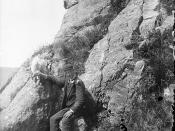Characterized as the first anti-war novel of its time, All Quiet on the Western Front is a novel dealing with the tragedy of war and the extermination of an entire generation of men, for those that "may have escaped its shells, were destroyed by the war." The book is peppered with examples of the "Lost Generation," as well as images of man's inhumanity to man. Remarque states simply that this is not a book that exemplifies war by encompassing a love story, nor by turning it into an adventure, "for death is not an adventure to those who stand face to face with it." Through the character of Paul Baumer, Remarque illustrates these recurring themes and the effects of the war on the Lost Generation.
In times of war, average citizens are taught to kill anything that does not carry the same flag as they do. Soldiers will kill men exactly like them for no other reason than they are from a different country.
Paul displays this characteristic in the Gerald Duval incident. "I do not think at all, I make no decision--I strike madly at home, and feel only how the body suddenly convulses, then becomes limp, and collapses." (263). Paul does not understand what he is doing; it is just his primordial instinct to "KILL! KILL! KILL!" However, this is not how Paul used to be, and so Paul points a finger at Kantorek and all like him. He says:
For us lads of eighteen they ought to have been mediators and guides to the world of maturity, the world of work, of duty, of culture, of progress--to the future...in our hearts we trusted them. The idea of authority, which they represented, was associated in our minds with a greater insight and a more humane...


![[Portrait of Les Paul, Fat Tuesday, New York, N.Y., ca. 1980s] (LOC)](https://s.writework.com/uploads/3/31608/portrait-les-paul-fat-tuesday-new-york-n-y-ca-1980s-loc-thumb.jpg)